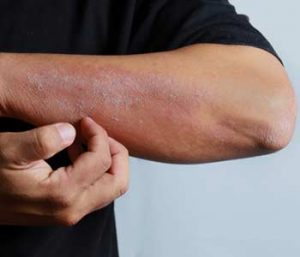Eczema and psoriasis are painful, itchy skin conditions that can cause you misery any time of the year but tend to really flare up in the winter. At this time of year, the cold and dry air saps skin of its natural protective moisture, which can exacerbate these skin conditions. Dr. Roger Koreen, experienced dermatologist in Huntington, NY, explains what eczema and psoriasis are and ways to prevent them this winter so you can stay itch- and pain-free while you have fun in the snow and sun.

Eczema and psoriasis cause many of the same symptoms and can appear very similar but have different causes and need different types of treatments. Both cause dry, scaly skin that can be red, itchy, and painful. An experienced dermatologist such as Dr. Koreen can examine your skin to determine which condition you have and provide you with the best solutions to treat it.
Eczema overview and causes
Over 30 million Americans deal with eczema and it can affect all ages, from infants to adults. Several types of eczema afflict people and the location it appears on your body can vary.
Common types of eczema include, among others:
- Atopic dermatitis: This is an inflammatory, chronic type of eczema. The cause is not fully known but is thought to be due to an overactive immune system in response to irritants or allergens. Its symptoms can include redness, itching, dry or scaly skin, and weepy sores.
- Contact dermatitis: This type of eczema occurs when you touch an irritating allergen or substance, which then causes your skin to itch, burn, blister, or become red. It appears on the part of your body that touched the irritant.
- Dyshidrotic eczema: Stress, exposure to irritating substances, and allergies can trigger this type of eczema, which causes small and itchy blisters.
We Are always available to help you.... Call Us Today
New Patients: (631) 417-3300 | Existing Patients: (631) 421-4398 Book an AppointmentPsoriasis overview and causes
Psoriasis is a common condition. With psoriasis, your immune system triggers the life cycle of your skin cells to go faster than usual, which causes extra cells to build up on your skin and results in scaly, red patches that can be painful or itchy. It is a chronic condition and the primary treatment goal for it is to prevent your skin cells from growing too rapidly. There are several different types of psoriasis that affect different body parts, but most types go in cycles in which flare-ups happen for a few weeks to months at a time and then you go into remission.
The cause of psoriasis is not completely known, but doctors think it is due to a problem with overactive T cells and neutrophils, which are a kind of white blood cell. Psoriasis can be triggered by several things such as infections, stress, smoking, vitamin D deficiency, injuries, obesity, and certain types of medications.
Ways to protect your skin this winter
 While you may not be able to fully prevent eczema or psoriasis from developing in the winter, you can take the following precautions to minimize your chances of a painful, itchy flare-up.
While you may not be able to fully prevent eczema or psoriasis from developing in the winter, you can take the following precautions to minimize your chances of a painful, itchy flare-up.
- Moisturize your skin several times a day with a high-quality, heavy moisturizer such as shea butter or oil-based emollients
- Avoid skincare products that are drying or irritating and opt instead for mild products that are designed for sensitive skin
- Get adequate vitamin D by taking a supplement since your body cannot produce as much naturally when you are exposed to winter sunlight
- Avoid exposing yourself to rapid changes in temperature, and remove wet clothes immediately after being exposed to rain, snow, or sweat
- Visit your dermatologist to get prescription ointments, creams, or medications if a flare-up occurs
Food allergies may also cause your eczema or psoriasis to flare up, so a visit to your doctor to help diagnose any allergies can also provide relief.
Schedule a consultation to treat your skin condition today Dr. Roger Koreen and the team at Dermatology and Cosmetic Laser Center have extensive training in both medical and cosmetic skin treatments and are committed to providing excellent care that is personalized for your individual needs. The office is conveniently located in Huntington, NY and includes the latest technologies, services, and products. Dr. Koreen will conduct a thorough exam and will discuss recommended treatment plans that are customized for your unique skin. He will also address any questions or concerns you may have about the treatment and provides comprehensive follow-up instructions and care.
Start seeing the difference that high quality dermatology care can make for your skin and well-being! Call Dr. Koreen at Dermatology and Cosmetic Laser Center today at (631) 417-3300 to schedule your consultation.









